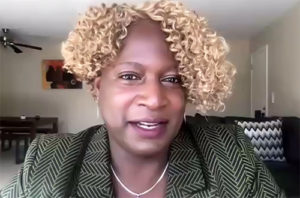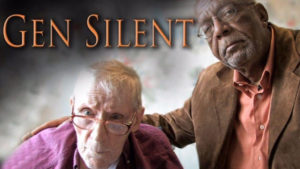Life Experiences, Research Combine to Create Successful Horizons of Aging Summit Affirming LGBTQ Older Adults

Personal stories from older LGBTQ+ adults, research and data analysis, and honest conversations on next steps all combined to create a successful 2020 Horizons of Aging Summit virtual event. Held Nov. 16-18, 2020, the Summit was presented by the Ruth Frost Parker Center for Abundant Aging of United Church Homes and Rainbow Eldercare of Greater Dayton (Ohio).
Patterned after a 2019 in-person event in the Dayton area, this year’s virtual experience provided a similar networking and information gathering experience, with the additional benefit of welcoming attendees from across the country. The summit was set up specifically to affirm the lives of older LGBTQ+ people and to educate older adult service providers about the unique needs of the LGBTQ+ community.
“Following the energy and positive response from our 2019 event, we were hoping to re-create the opportunity for community and connections for those concerned about the challenges that many in the LGBT community face as they age,” said the Rev. Beth Long-Higgins, executive director of the Parker Center. “Even in the virtual webinar format, we were able to see the connections that the sessions were creating for the participants in the chat area, and with the conversations with the presenters. And by the last day, people were making suggestions for a next event!”
The summit kicked off with a keynote presentation by Arykah Carter, a Black trans woman, TransOhio board member, and community activist. Carter, who currently is attending seminary, told attendees that while she “discovered herself early,” she didn’t act on it because of fear and the lack of a supportive community — a lament voiced by other trans participants during the event.
Carter talked about her childhood and young adulthood, and her struggle and ultimate ability to live authentically, a struggle that included doing “everything I was supposed to do to be this guy that everyone expected me to be.”
When discussing her experience of transitioning after age 40, when the lifespan of a trans woman is 35, Carter said she wants to inspire and encourage other trans and non-binary persons. “I’ve learned that you have to be honest, especially with those you love and care for,” she told listeners.
Carter talked about the choices that lie ahead for many LGBTQ+ people, particularly for trans people, in finding housing and health care as they get older. She asked, “Do I have to ‘de-transition’ when I get old? As we age, we think about that — it’s harder for trans folks.”

The idea of going back into the closet, or “de-transitioning” also was a subject of the second day’s keynote, a panel discussion on the award-winning film Gen Silent, 10 years after the film’s release. The discussion took place after Summit participants watched the film with Richelle Frabotta, M.S.Ed., instructor and coordinator of the Sexuality Education Studies Center at Miami (Ohio) University, serving as moderator. The panelists included Gen Silent filmmakers Stu Maddox and Joe Applebaum; Mel Simms, who was featured in the film; and Suzanne Ford, a trans woman, activist, and SF Pride board member.
When they originally made the film, Maddox and Applebaum “wanted to raise awareness for older LGBT folks and their challenges” because there were no role models they could use to grow older with. “Our visibility and voice were missing,” Maddox said.
Even today, 10 years later, Applebaum told participants that the idea is still new to a lot of people. “There is a recognition that aging LGBT is not the same as with straight people” every time the film is screened. “There’s a sense of recognition when we show the film. Even today, there’s that one person who says, ‘I had no idea! I never thought about it!’”
Most of the discussion revolved around the differences in society since the film’s release, including not only the empowerment felt by younger LGBTQ+ people, but also the awareness of organizing by anti-trans groups.
Ten years later, people who have hate for trans people are now organized, said Ford, which adds a dangerous, unsafe element for trans persons.
Simms best summed up the hope built over the past 10 years. In telling his story, Simms said, “It’s been a long, rough life. I don’t think of myself as an elder, but I actually am! I’m 76 now. Growing up, color had always been the number one issue for me, so I sort of thought I could hide my homosexuality because people would see my color first. As I was living with Walter, I began to want to come out — to make myself feel more whole.
“I admire very much young people, particularly of color, that want to come out sooner — as in some of the demonstrations that have been happening across the country. That’s exhilarating!”
Ford acknowledged the decision that lies ahead for LGBTQ+ persons in choosing what to do as they age. Aging by one’s self, she said, is particularly frightening. “If I move back to Kentucky to be with family when I’m older, I’ll leave my whole community of friends behind,” she said. “That fills me with dread. I don’t know how I’ll deal with that.”
The issue of a support community was, and continues to be, key in discussing the film’s continued impact, as the film creates opportunities for connection, Applebaum said.
“What we’re talking about here demonstrates how important your support network is,” he said. “you’re never too young to start that network. The wider the network you have, the better of you’re going to be.”
Long-Higgins said she found the Carter and Gen Silent keynotes most profound. “Although I love a good presentation based on data and research, I am always moved by the personal stories from the real experiences of lived lives,” she said. “The keynote with Arykah Carter was inspiring and the panel conversation following the Gen Silent documentary was exceptional. Both of these presentations really looked at the intersections of race and gender expression, orientation and identity.”
The Summit’s third day keynote consisted of a reporting out of the findings of a recent “Thrive with Pride Aging Survey.” In initiating and conducting the first-of-its-kind study, local community organizations within Dayton and Montgomery (Ohio) Counties worked with Rainbow Elder Care of Greater Dayton, Wright State University Department of Social Work and Wright State’s Boonshoft School of Medicine, and several other local organizations.
Data was collected over 15 months during 2019 and 2020. Comparisons in adults over age 50 were made by gender identity and sexual orientation to the larger population’s demographics.
Anne Proulx, DO, Wright State, reported that several medical conditions, including depression, high blood pressure, arthritis, obesity, and diabetes presented in the self-reported data from participants. The prevalence of depression was the biggest difference, with nearly 40 percent of respondents in all sub groups reporting depression, as opposed to 7.7 percent of the general population of U.S. adults over age 50.
Jerry Mallicoat, LGBTQ Health Initiatives project manager and board chair of Rainbow Elder Care, observed that weight issues, memory decline, mental health issues, and housing insecurity were some of the biggest concerns of participants. As a result of the study, he said, housing efforts are underway to develop safe and affirming options for low-income LGBTQ older adults.
Following each day’s keynote, a series of additional workshops and presentations were held on such topics as how LGBT aging differs from heterosexual, cisgender older adults; healthcare delivery for LGBTQ+ patients; suicide prevention; the experiences, barriers and needs of LGBTQ+ elders related to mental health; trauma and grief recovery, caregiving for LGBTQ+ adults with Alzheimer’s Disease; and a special session on the particular vulnerability of the LGBTQ+ community to COVID-19 because of the prevalence of health disparities and other sociodemographic factors.
For the Rev. Kenneth V. Daniel, CEO and president of United Church Homes, the Horizons Summit was one more way UCH works to meet the needs of the local LGBTQ community. “As co-sponsor of the Horizons Summit event, United Church Homes has deepened its engagement with the LGBTQ community in Dayton and Ohio,” he said. “I commend Jerry Mallicoat, the Rev. Beth Long-Higgins, and the planning team for pivoting to the virtual format in light of the pandemic. The event was well organized, ran smoothly, and provided many different professionals speaking to the various needs of LGBT elders and those who care for and empower them.”
Both those who presented and those who attended offered suggestions for future similar events, including the role and importance of LGBTQ allies. That fits with both the community’s need and the ministry and outreach of United Church Homes, says Daniel.
“The United Church of Christ and the Council for Health and Human Service Ministries have a deep commitment to justice for and engagement with the LGBTQ community,” he said. “The board of United Church Homes has long espoused our desire to be allies and partners with churches, the LGBTQ community, and others to share in this important work for justice. The Summit provided the opportunity for service organizations, professionals and educational institutions to share information, discover collaborators, and identify potential solutions to longstanding community problems and service gaps.”
Join Our Mailing LIst
Follow on Facebook
Iredell Adult Day Services Hosts Ribbon-Cutting to Celebrate Adult Day Health Certification - CHHSM
www.chhsm.org
Iredell Adult Day Services (IADS) in Newton, N.C. — a nonprofit organization dedicated to caring for older adults, vulnerable groups, and their families, and part of EveryAge — hosted a ribbon cut...